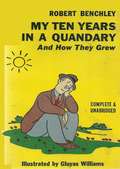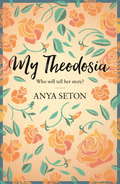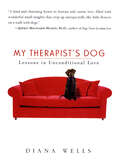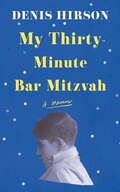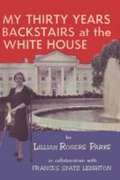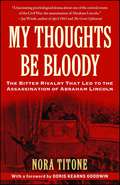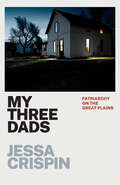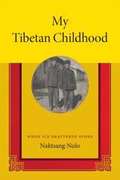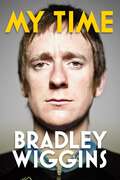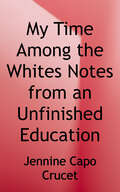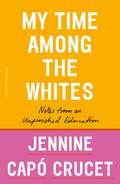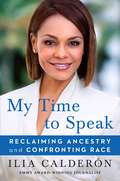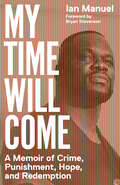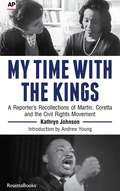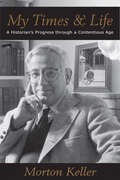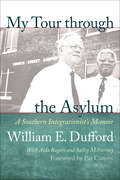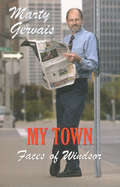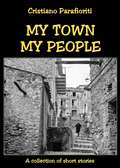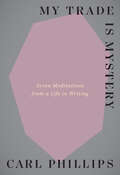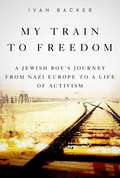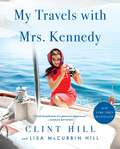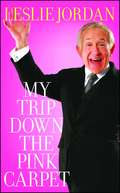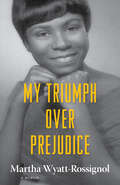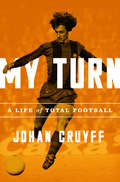- Table View
- List View
My Ten Years in a Quandary and How They Grew
by Robert BenchleyWhen Robert Benchley died in 1945, his obituaries read like love-letters from the world. Here is a collection of his short, whimsical, hilarious articles which show why.With befuddled and heroic bewilderment Benchley faces his problems. Among others are the mislaid locomotive, a dachshund who sued for libel, and a songbird who was "out to get" Benchley.It ends with five sizzling chapters of his "Untold Story," starting when, as an innocent young man from the country (Boston), he arrived in the city (New York) looking for pitfalls. (It was a holiday and they were all closed.)"...it is a saga of the gaga, and probably not far from his masterpiece."--New York TimesA rare gem of a book!Illustrated by Gluyas Williams
My Theodosia
by Anya SetonA compelling romance and portrayal of a fascinating figure in American history, from the bestselling author of Katherine.Theodosia is the daughter of Aaron Burr, Vice President of the United States serving under Thomas Jefferson. She is unwaveringly devoted to her father and he worships her. But his arrogant ambitions force her to choose between the man he insists she marry and the young soldier she truly loves. These same ambitions set in motion a chain of events that will end in treason and tragedy. Based on meticulous research, Anya Seton's first novel, originally published in 1941, captures all the drama of the short life of Theodosia Burr (1783-1813).
My Therapist's Dog: Lessons in Unconditional Love
by Diana WellsDiana Wells's intriguing exploration into the rewards of relationships--both the canine and human varieties--begins when she reluctantly starts seeing a psychologist, Beth, during a difficult time in her life. With no insurance to pay for counseling, a barter is arranged in which the client becomes part-time caretaker to the therapist's dog, Luggs, a sweet, clumsy black Labrador retriever. As Wells examines her past--her peripatetic childhood, her eccentric family, her grief over the deaths of loved ones--Luggs provides a bridge between therapist and patient. Dog lover by nature, historian by trade, Wells finds herself curious about the connections that dogs and humans have shared for centuries--and what these bonds tell us about our own psyches. Wells observes that training a dog has much in common with the therapeutic techniques her psychologist employs. Looking into recent experiments that have proved dogs better at interpreting human behavior than chimps or wolves, Wells explores the subtleties of her own relationship with dogs. Increasingly she finds herself agreeing with Diogenes, the original Greek cynic (the word cynic comes from the greek kuon, meaning "dog"), who said that unless we think like dogs, happiness will elude us. Wells analyzes what we name our dogs, how we breed them, how we've explored the wilderness with them, the kinds of literature we write about them, why we love them, and, most important, what we can learn from them. When an unexpected illness befalls Beth, Luggs comforts the two women, and his devotion helps Wells come to accept that relationships--despite the possibility of hurt and pain--are what life is all about.
My Thirty-Minute Bar Mitzvah: A Memoir
by DENIS HIRSONA &“beautifully written, funny and deeply moving&” memoir about a son&’s reckoning with his father&’s political idealism, set against the menacing backdrop of apartheid-era South Africa (Finuala Dowling, author of The Man Who Loved Crocodile Tamers)A bestselling South African writer known for tackling history and memory finally makes his American debutWitty and deeply poignant, My Thirty-Minute Bar Mitzvah is a breathtaking account of one man being confronted by his past and, ultimately, how his daughter proved to be the key in understanding his own father.Recreating 1960s Johannesburg through his adolescent eyes, bestselling South African author Denis Hirson gradually reveals the details of his extraordinary 13th birthday as he explores the familial and political divisions in Apartheid South Africa that weighed on him and his developing consciousness of his Jewish heritage.My Thirty-Minute Bar Mitzvah is a gem of a book about becoming a man. It&’s also a valuable account of a forgotten time of white, Jewish activists, their families, their community, and most importantly, their children, who had to stumble through life in the aftermath of their commitment to racial justice.
My Thirty Years Backstairs at the White House
by Lillian Rogers Parks Frances Spatz LeightonThis book should be required reading for every serious student of American history. The authors were eye witnesses to some of the great events of history and offer different perspectives from that found elsewhere. The unique perspective offered by this book arises from the fact that the authors are two White House domestic servants, each of whom worked for 30 years in the White House. As there was an overlap of ten years that both of them worked there together, that means that they were in the White House for a 51-year span from the end of 1909 until 1960, when Lillian Rogers Parks retired at age 64 in the concluding days of the Eisenhower Administration.
My Thoughts Be Bloody
by Nora TitoneThe scene of John Wilkes Booth shooting Abraham Lincoln in Ford's Theatre is among the most vivid and indelible images in American history. The literal story of what happened on April 14, 1865, is familiar: Lincoln was killed by John Wilkes Booth, a lunatic enraged by the Union victory and the prospect of black citizenship. Yet who Booth really was--besides a killer--is less well known. The magnitude of his crime has obscured for generations a startling personal story that was integral to his motivation. My Thoughts Be Bloody, a sweeping family saga, revives an extraordinary figure whose name has been missing, until now, from the story of President Lincoln's death. Edwin Booth, John Wilkes's older brother by four years, was in his day the biggest star of the American stage. He won his celebrity at the precocious age of nineteen, before the Civil War began, when John Wilkes was a schoolboy. Without an account of Edwin Booth, author Nora Titone argues, the real story of Lincoln's assassin has never been told. Using an array of private letters, diaries, and reminiscences of the Booth family, Titone has uncovered a hidden history that reveals the reasons why John Wilkes Booth became this country's most notorious assassin. These ambitious brothers, born to theatrical parents, enacted a tale of mutual jealousy and resentment worthy of a Shakespearean tragedy. From childhood, the stage-struck brothers were rivals for the approval of their father, legendary British actor Junius Brutus Booth. After his death, Edwin and John Wilkes were locked in a fierce contest to claim his legacy of fame. This strange family history and powerful sibling rivalry were the crucibles of John Wilkes's character, exacerbating his political passions and driving him into a life of conspiracy. To re-create the lost world of Edwin and John Wilkes Booth, this book takes readers on a panoramic tour of nineteenth-century America, from the streets of 1840s Baltimore to the gold fields of California, from the jungles of the Isthmus of Panama to the glittering mansions of Gilded Age New York. Edwin, ruthlessly competitive and gifted, did everything he could to lock his younger brother out of the theatrical game. As he came of age, John Wilkes found his plans for stardom thwarted by his older sibling's meteoric rise. Their divergent paths--Edwin's an upward race to riches and social prominence, and John's a downward spiral into failure and obscurity--kept pace with the hardening of their opposite political views and their mutual dislike. The details of the conspiracy to kill Lincoln have been well documented elsewhere. My Thoughts Be Bloody tells a new story, one that explains for the first time why Lincoln's assassin decided to conspire against the president in the first place, and sets that decision in the context of a bitterly divided family--and nation. By the end of this riveting journey, readers will see Abraham Lincoln's death less as the result of the war between the North and South and more as the climax of a dark struggle between two brothers who never wore the uniform of soldiers, except on stage.
My Three Dads: Patriarchy on the Great Plains
by Jessa CrispinSharp and thought-provoking, this memoir-meets-cultural criticism upends the romanticism of the Great Plains and the patriarchy at the core of its ideals. For many Americans, Kansas represents a vision of Midwestern life that is good and wholesome and evokes the American ideals of god, home, and country. But for those like Jessa Crispin who have grown up in Kansas, the realities are much harsher. She argues that the Midwestern values we cling to cover up a long history of oppression and control over Native Americans, women, and the economically disadvantaged. Blending personal narrative with social commentary, Crispin meditates on why the American Midwest still enjoys an esteemed position in our country's mythic self-image. Ranging from The Wizard of Oz to race, from chastity to rape, from radical militias and recent terrorist plots to Utopian communities, My Three Dads opens on a comic scene in a Kansas rent house the author shares with a (masculine) ghost. This prompts Crispin to think about her intellectual fathers, her spiritual fathers, and her literal fathers. She is curious to understand what she has learned from them and what she needs to unlearn about how a person should be in a family, as a citizen, and as a child of god—ideals, Crispin argues, that have been established and reproduced in service to hierarchy, oppression, and wealth. Written in Crispin’s well-honed voice—smart, assured, comfortable with darkness—My Three Dads offers a kind of bleak redemption, the insight that no matter where you go, no matter how far from home you roam, the place you came from is always with you, “like it or not.”
My Three Dads: Patriarchy on the Great Plains
by Jessa CrispinSharp and thought-provoking, this memoir-meets-cultural criticism upends the romanticism of the Great Plains and the patriarchy at the core of its ideals. For many Americans, Kansas represents a vision of Midwestern life that is good and wholesome and evokes the American ideals of god, home, and country. But for those like Jessa Crispin who have grown up in Kansas, the realities are much harsher. She argues that the Midwestern values we cling to cover up a long history of oppression and control over Native Americans, women, and the economically disadvantaged. Blending personal narrative with social commentary, Crispin meditates on why the American Midwest still enjoys an esteemed position in our country's mythic self-image. Ranging from The Wizard of Oz to race, from chastity to rape, from radical militias and recent terrorist plots to Utopian communities, My Three Dads opens on a comic scene in a Kansas rent house the author shares with a (masculine) ghost. This prompts Crispin to think about her intellectual fathers, her spiritual fathers, and her literal fathers. She is curious to understand what she has learned from them and what she needs to unlearn about how a person should be in a family, as a citizen, and as a child of god—ideals, Crispin argues, that have been established and reproduced in service to hierarchy, oppression, and wealth. Written in Crispin’s well-honed voice—smart, assured, comfortable with darkness—My Three Dads offers a kind of bleak redemption, the insight that no matter where you go, no matter how far from home you roam, the place you came from is always with you, “like it or not.”
My Tibetan Childhood: When Ice Shattered Stone
by Naktsang Nulo Sonam Lhamo Angus CargillIn My Tibetan Chldhood, Naktsang Nulo recalls his life in Tibet's Amdo region during the 1950s. From the perspective of himself at age ten, he describes his upbringing as a nomad on Tibet's eastern plateau. He depicts pilgrimages to monasteries, including a 1500-mile horseback expedition his family made to and from Lhasa. A year or so later, they attempted that same journey as they fled from advancing Chinese troops. Naktsang's father joined and was killed in the little-known 1958 Amdo rebellion against the Chinese People's Liberation Army, the armed branch of the Chinese Communist Party. During the next year, the author and his brother were imprisoned in a camp where, after the onset of famine, very few children survived.The real significance of this episodic narrative is the way it shows, through the eyes of a child, the suppressed histories of China's invasion of Tibet. The author's matter-of-fact accounts cast the atrocities that he relays in stark relief. Remarkably, Naktsang lived to tell his tale. His book was published in 2007 in China, where it was a bestseller before the Chinese government banned it in 2010. It is the most reprinted modern Tibetan literary work. This translation makes a fascinating if painful period of modern Tibetan history accessible in English.
My Time
by Bradley Wiggins"This book had me hooked from the start. A wonderfully told and often quite frank story of an incredible sportsman and his life, from a child up to his amazing tour de France and Olympic victories." On July 22, 2012, Bradley Wiggins made history as the first British cyclist to win the Tour de France. Ten days later, at the London Olympic Games, he won the time trial to become his country's most decorated Olympian. In an instant, "Wiggo"--now Sir Bradley Marc Wiggins--became a national hero. Two years previously, however, Wiggins had been staring into the abyss. His much-hyped attempt to conquer the 2010 Tour de France had ended in public humiliation. Poor results and indifferent form left him facing release from Team Sky. And then he was hit with the tragic news of the death of his grandfather, George, the man who had raised him as a young boy. At rock bottom, Wiggins had to reach deep inside and find the strength to fight his way back. Outspoken, honest, intelligent, and fearless, Wiggins has been hailed as the people's champion. In My Time, he tells the story of the remarkable journey that led him from his lowest ebb to win the world's toughest race. He opens up about the personal anguish that has driven him on and what it's like behind the scenes at Team Sky: the brutal training regimes, the sacrifices, and his views on his teammates and rivals. He talks too about his anger at the specter of doping that pursues his sport, how he dealt with the rush of taking Olympic gold, and above all what it takes to be the greatest.
My Time Among the Whites: Notes From an Unfinished Education
by Jennine Capo CrucetIn this sharp and candid collection of essays, critically acclaimed writer and first-generation American Jennine Capó Crucet explores the condition of finding herself a stranger in the country where she was born. <p><p>Raised in Miami and the daughter of Cuban refugees, Crucet examines the political and personal contours of American identity and the physical places where those contours find themselves smashed: be it a rodeo town in Nebraska, a university campus in upstate New York, or Disney World in Florida. Crucet illuminates how she came to see her exclusion from aspects of the theoretical American Dream, despite her family's attempts to fit in with white American culture--beginning with their ill-fated plan to name her after the winner of the Miss America pageant. <p><p>In prose that is both fearless and slyly humorous, My Time Among the Whites examines the sometimes hopeful, sometimes deeply flawed ways in which many Americans have learned to adapt, exist, and--in the face of all signals saying otherwise--perhaps even thrive in a country that never imagined them here.
My Time Among the Whites: Notes from an Unfinished Education
by Jennine Capó CrucetFrom the author of Make Your Home Among Strangers, essays on being an “accidental” American—an incisive look at the edges of identity for a woman of color in a society centered on whitenessIn this sharp and candid collection of essays, critically acclaimed writer and first-generation American Jennine Capó Crucet explores the condition of finding herself a stranger in the country where she was born. Raised in Miami and the daughter of Cuban refugees, Crucet examines the political and personal contours of American identity and the physical places where those contours find themselves smashed: be it a rodeo town in Nebraska, a university campus in upstate New York, or Disney World in Florida. Crucet illuminates how she came to see her exclusion from aspects of the theoretical American Dream, despite her family’s attempts to fit in with white American culture—beginning with their ill-fated plan to name her after the winner of the Miss America pageant.In prose that is both fearless and slyly humorous, My Time Among the Whites examines the sometimes hopeful, sometimes deeply flawed ways in which many Americans have learned to adapt, exist, and—in the face of all signals saying otherwise—perhaps even thrive in a country that never imagined them here.
My Time to Speak: Reclaiming Ancestry and Confronting Race
by Ilia CalderónAn inspiring, timely, and conversation-starting memoir from the barrier-breaking and Emmy Award–winning journalist Ilia Calderón—the first Afro-Latina to anchor a high-profile newscast for a major Hispanic broadcast network in the United States—about following your dreams, overcoming prejudice, and embracing your identity.As a child, Ilia Calderón felt like a typical girl from Colombia. In Chocó, the Afro-Latino province where she grew up, your skin could be any shade and you&’d still be considered blood. Race was a non-issue, and Ilia didn&’t think much about it—until she left her community to attend high school and college in Medellín. For the first time, she became familiar with horrifying racial slurs thrown at her both inside and outside of the classroom. From that point on, she resolved to become &“deaf&” to racism, determined to overcome it in every way she could, even when she was told time and time again that prominent castings weren&’t &“for people like you.&” When a twist of fate presented her the opportunity of a lifetime at Telemundo in Miami, she was excited to start a new life, and identity, in the United States, where racial boundaries, she believed, had long since dissolved and equality was the rule. Instead, in her new life as an American, she faced a new type of racial discrimination, as an immigrant women of color speaking to the increasingly marginalized Latinx community in Spanish. Now, Ilia draws back the curtain on the ups and downs of her remarkable life and career. From personal inner struggles to professional issues—such as being directly threatened by a Ku Klux Klan member after an interview—she discusses how she built a new identity in the United States in the midst of racially charged violence and political polarization. Along the way, she&’ll show how she&’s overcome fear and confronted hate head on, and the inspirational philosophy that has always propelled her forward.
My Time Will Come: A Memoir of Crime, Punishment, Hope, and Redemption
by Ian ManuelAt fourteen Ian Manuel was sentenced to life without parole. My Time Will Come is a paean to the capacity of the human will to transcend adversity through determination and art. &“Ian is magic. His story is difficult and heartbreaking, but he takes us places we need to go to understand why we must do better.&” —Bryan Stevenson, author of Just Mercy&“My story has been told many times and by highly regarded experts in their fields—judges, prosecutors, juvenile probation officers, sociologists, journalists. But I would like to try to tell it to you myself. I have reason to believe the experts may be wrong about me. You see, today, thirty years later, I am neither in prison nor dead.&” —from My Time Will Come The United States is the only country in the world that sentences thirteen- and fourteen-year-old offenders, mostly youth of color, to life in prison without parole, regardless of the scientifically proven singularities of the developing adolescent brain—a heinous wrinkle in the scandal of mass incarceration. In 1991, Ian Manuel, then fourteen, was sentenced to life without parole for a non-homicide crime. In a botched mugging attempt with some older boys, he shot Debbie Baigrie, a young white mother of two, in the face. But as Bryan Stevenson, attorney and executive director of the Equal Justice Initiative, has insisted, none of us should be judged by only the worst thing we have ever done. Capturing the fullness of his humanity, here is Manuel&’s powerful testimony of growing up homeless in Central Park Village in Tampa, Florida—a neighborhood riddled with poverty, gang violence, and drug abuse—and of his efforts to rise above his circumstances, only to find himself, partly through his own actions, imprisoned for two-thirds of his life, eighteen years of which were spent in solitary confinement. Here is the at once wrenching and inspiring story of how he endured the savagery of the United States prison system, and how his victim, an extraordinary woman, forgave him and bravely advocated for his freedom, which was achieved by a crusade on the part of the Equal Justice Initiative to address the barbarism of our judicial system and bring about &“just mercy.&” Full of unexpected twists and turns as it describes a struggle to attain the glory of redemption, My Time Will Come is a paean to the capacity of the human will to transcend adversity through determination and art—in Ian Manuel&’s case, through his dedication to writing poetry.
My Time with the Kings: A Reporter’s Recollections of Martin, Coretta and the Civil Rights Movement
by Andrew Young Kathryn Johnson“Let Kathryn in,” said Coretta Scott King to authorities.Three simple words that provided Kathryn Johnson, a reporter for The Associated Press’s Atlanta bureau, unprecedented access to the grieving widow in the days following her husband’s death.Johnson was on her way to a movie date when word came from Memphis that Martin Luther King Jr. had been assassinated. She immediately headed for the King home where, despite resistance from authorities on the scene, she was the only reporter allowed inside. Johnson’s many years covering King and his family had earned her the trust to be a discreet, observant witness to the aftermath of a defining moment in American history.Kathryn Johnson covered the civil rights movement across the South in the 1960s, often risking her own safety to observe first-hand the events of this great era. Her stories took her from witnessing the integration of the University of Georgia by dressing as a student, to hiding unobserved under a table near an infamous schoolhouse door in Alabama, to marching with the massive crowd from Selma to Montgomery.Johnson, one of the only female reporters on the scene, threw herself into charged situations with a determination to break the news no matter what. Including never-before-published photos, her personal account of this period is a singular addition to the story of the civil rights movement.
My Times & Life: A Historian's Progress Through a Contentious Age
by Morton KellerMorton Keller recounts his "not extraordinary life played out in quite extraordinary times"—from the Great Depression through World War Two, the cold war, the sixties, and 9/11. A classic American saga of respectable achievement from relatively humble origins, his life through eight-plus decades as a dues-paying member of the middle class resonates beyond the individual to echo the experiences, the beliefs, and the values of his generation.
My Tour through the Asylum: A Southern Integrationist's Memoir
by William E. Dufford Aïda Rogers Salley McInerney“[A] testament to his journey toward South Carolina’s—not only desegregation of schools—but full integration and voice for African American students.” —Libby Bernardin, author of Stones Ripe for SowingImmortalized in the writings of his most famous student, bestselling author Pat Conroy, veteran education administrator William E. Dufford has led an inspirational life as a stalwart champion for social justice and equal access for all to the empowerment of a good public education. A quintessential Southern storyteller now in his nineties, Dufford reflects on his own transformation through education, from his upbringing in the segregationist Jim Crow Era-South of the 1930s and 1940s to becoming an accomplished integrationist revered by his pantheon of former colleagues and students. In My Tour through the Asylum, several of these supporters share their own candid recollections of Dufford alongside his life story, adding context and anecdotes to the narrative.Dufford credits the evolution of his mindset from segregationist to integrationist to the good influence of two experiences: his service in the US Navy in the 1940s opening his eyes to a larger worldview and his later doctoral training at the University of Florida under nationally recognized professors introducing him to global perspectives of education.Drawing the book title and themes from nineteenth-century statesman James Louis Petigru’s infamous assessment that South Carolina was “too small to be a republic and too big to be an insane asylum,” Dufford offers an insightful, pragmatic, and ultimately hopeful tour through his lived experiences in the courageous, committed service of education and enlightenment.“William Dufford’s memoir is a remarkable example of courage, passion, and determination.” —Peggy B. Winder, Newberry College
My Town
by Marty GervaisMy Town brings together more than 70 snapshots of the people and places that have called Windsor home. More than this, they have made Windsor, for better and for worse, the city it is today. Some of these faces you will recognize; others will have slipped beneath the radar. Marty has sought them out and made their stories his own.
My town, my people
by Louise Rabour Cristiano ParafioritiGalati Mamertino is a small mountain town nestled in the Nebrodi national park, oozing with history from its very walls: and a small part of that history will come to life in "my country, my people". Through twenty short stories, rich with vivid characters, intoxicating smells and ancient flavors, the author paints a picture of his youth, cleverly moving between fact and fiction. Reading these pages we hear the fragile voice of the South, a voice suffocated by the numbness born of resignation and sadness, but which at the same time speaks of a love of times gone by, of a poor but sanguine land, exhausted and wounded from the plague of poverty, injustice and emigration but still very much alive in the minds and memories of those who left. And those memories lodge in the mind and settle in the heart as an emotional reservoir overflowing with words, thoughts and images of a moment, a day, an era once lived and still able to touch us deeply.
My Trade Is Mystery: Seven Meditations from a Life in Writing
by Carl PhillipsAn invaluable companion for any writer seeking to make the writing life a more complex and cooperative venture &“A lovely, loving letter to aspiring writers.&”—Diego Báez, Booklist In these intimate and eloquent meditations, the award-winning poet Carl Phillips shares lessons he has learned about the writing life, an &“apprenticeship to what can never fully be mastered.&” Drawing on forty years of teaching and mentoring emerging writers, he weaves his experiences as a poet with the necessary survival skills, including ambition, stamina, silence, politics, practice, audience, and community. In the tradition of Anne Lamott&’s Bird by Bird, Rainer Maria Rilke&’s Letters to a Young Poet, and Marcus Aurelius&’s Meditations, this is an invaluable companion for writers at every stage of their journey. Phillips&’s book serves as a partner in speculation and an invitation to embrace mystery.
My Train to Freedom: A Jewish Boy?s Journey from Nazi Europe to a Life of Activism
by Ivan BackerThe breathtaking memoir by a member of "Nicky’s family,” a group of 669 Czechoslovakian children who escaped the Holocaust through Sir Nicholas Winton’s Kindertransport project, My Train to Freedom relates the trials and achievements of award-winning humanitarian and former Episcopal priest, Ivan Backer. As Backer recounts in his memoir, in May of 1939 as a ten-year-old Jewish boy, he fled Nazi-occupied Czechoslovakia for the United Kingdom aboard one of the Kindertransport trains organized by Nicholas Winton, a young London stockbroker. The final train was canceled September 1 when Hitler invaded Poland. The 250 children scheduled for that train were left on the platform and later transported to concentration camps and presumably perished. Detailed in this page-turning true story is Backer’s dangerous escape, his boyhood in England, his perilous 1944 voyage to America, and his mantra today. Now he is an eighty-six-year-old who remains an activist for peace and justice. He has been influenced by his Jewish heritage, his Christian boarding school education in England, and the always present question, "For what purpose was I spared the Holocaust?” My Train to Freedom was thoroughly researched and shaped by Backer’s own memories. It includes interviews he conducted in 1980 in Czech with his mother and her sister, later translated into English; a collection of conversations he had with his older brother and cousin; insights gained from the Czech film, Nicky’s Family, about the Kindertransport; and concludes with never-before-published death march accounts by two family members.
My Travels with Mrs. Kennedy
by Clint Hill Lisa McCubbin HillNEW YORK TIMES BESTSELLER The #1 New York Times bestselling authors of Mrs. Kennedy and Me reveal never-before-told stories of Secret Service Agent Clint Hill&’s travels with Jacqueline Kennedy through Europe, Asia, and South America. Featuring more than two hundred rare and never-before-published photographs.While preparing to sell his home in Alexandria, Virginia, retired Secret Service agent Clint Hill uncovers an old steamer trunk in the garage, triggering a floodgate of memories. As he and Lisa McCubbin, his coauthor on three previous books, pry it open for the first time in fifty years, they find forgotten photos, handwritten notes, personal gifts, and treasured mementos from the trips on which Hill accompanied First Lady Jacqueline Kennedy as her Secret Service agent—trips that took them from Paris to London, through India, Pakistan, Greece, Morocco, Mexico, South America, and &“three glorious weeks on the Amalfi Coast.&” During these journeys, Jacqueline Kennedy became one of her husband&’s—and America&’s—greatest assets; in Hill&’s words and the opinion of many others, &“one of the best ambassadors the United States has ever had.&” As each newfound treasure sparks long-suppressed memories, Hill provides new insight into the intensely private woman he always called &“Mrs. Kennedy&” and who always called him &“Mr. Hill.&” For the first time, he reveals the depth of the relationship that developed between them as they traveled around the globe. Now ninety years old, Hill recounts the tender moments, the private laughs, the wild adventures, and the deep affection he shared with one of the world&’s most beautiful and iconic women—and these memories are brought vividly to life alongside more than two hundred rare photographs, many of them previously unpublished. In addition to the humorous stories and intimate moments, Hill reveals startling details about how traveling helped them both heal during the excruciating weeks and months following the assassination of President John F. Kennedy in November 1963. He also writes of the year he spent protecting Mrs. Kennedy after the assassination, a time in his life he has always been reluctant to speak about. My Travels with Mrs. Kennedy unveils a personal side of history that has never been told before and takes the reader on a breathtaking journey, experiencing what it was like for Clint Hill to travel with Jacqueline Kennedy as the entire world was falling in love with her.
My Trip Down the Pink Carpet
by Leslie JordanA hilarious romp from small-town USA to the pink carpet of Hollywood with the beloved Emmy-winning actor, playwright, and gay icon Leslie Jordan is a small man with a giant propensity for scene stealing. Best known for his bravura recurring role as Karen's nemesis, Beverley Leslie, on Will & Grace (for which he won a Best Guest Actor in a Comedy Series Emmy in 2006), he has also made memorable appearances on Ally McBeal, Boston Public, Monk, and Murphy Brown. Raised in a conservative family in Chattanooga, Tennessee, Leslie -- who describes himself as "the gayest man I know" -- boarded a Greyhound bus bound for LA with $1,200 sewn into his underpants and never looked back. His pocket-sized physique and inescapable talent for high camp paved the way to a lucrative and varied career in commercials and on television. Along the way he immersed himself in writing for the stage, and his one-man testimonials have become cult off-Broadway hits. But with success came dangerous temptations: a self-proclaimed former substance abuser and sexaholic, Leslie has spent time in jail and struggled to overcome his addictions and self-loathing. My Trip Down the Pink Carpet is a rollicking, fast-paced collection of stories, served up with wit, panache, and plenty of biting asides. Filled with comically overwrought childhood agonies, offbeat observations, and revealing celebrity encounters -- from Boy George to George Clooney -- it delivers a fresh, laugh-out-loud take on Hollywood, fame, addiction, gay culture, and learning to love oneself.
My Triumph over Prejudice: A Memoir (Willie Morris Books in Memoir and Biography)
by Martha Wyatt-RossignolMy Triumph over Prejudice is the autobiography of a black girl growing up in Mississippi during the civil rights era. Born in 1949, Martha Wyatt-Rossignol came of age during some of the most crucial and dangerous years of the civil rights movement. She examines those years and what happened when the movement upended her small town of Fayette. She describes the conditions under which blacks lived during segregation and how those oppressive rules changed, despite massive resistance from whites. Wyatt-Rossignol faced racial hatred when she was chosen for an early school desegregation program. Her failed marriage to an African American led to her dating and later wedding a white man, a civil rights worker from the North, to whom she is still married. That union sparked disapproval from both the white and black communities, revealing entrenched complexities of race and racism in her hometown. Her story also follows the politics of that volatile era in a local context. Black politicians, helped by national civil rights figures, assumed more power and began improving life for all races in this rural area. Then came a betrayal felt by many blacks as these key figures overreached their authority and started pursuing their own selfish agendas. An intimate, revealing portrait of Charles Evers, the first black mayor of Fayette and brother of Medgar Evers, is included in this section. The memoir goes on to portray how the author learned to hate whites as a result of her experiences and how she later overcame that animosity. Wyatt-Rossignol's story concludes with her move out of Mississippi to the island of Bermuda, where she encountered a very different racial environment.
My Turn: A Life Of Total Football
by Johan CruyffJohan Cruyff embodied a footballing philosophy that now dominates coaching and playing styles in all the leading club sides around the world. You can dispute whether Cruyff was the greatest player ever—he was certainly one of the top three—but he is undoubtedly the player who single-handedly most changed the nature of the game.My Turn tells the story of Cruyff's remarkable career, built on the techniques he learned playing in the streets of postwar Amsterdam while hoping to be noticed by the city's most famous club, Ajax. He would eventually inspire that team to eight league championships and three European cups. He won his first of three Ballons d'Or in 1971 at age 24. In 1973, Cruyff was sold to Barcelona for a then-world-record transfer fee. He led the Catalans to victory in La Liga for the first time since 1960, and went on to leave a lasting mark on Spanish soccer. In the 1974 World Cup, Cruyff propelled the Dutch team to the final for the first time.Cruyff's lasting influence, however, is not in the medals he won, but in the style of play he epitomized and then applied to the Barcelona and Ajax teams he coached. His vision of "Total Football” transformed the way soccer was played, and its dazzling fluidity became the basis of the most admired sides around the world. He was the sport's uncompromising genius on and off the field of play.
